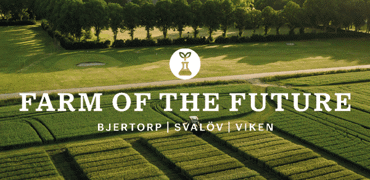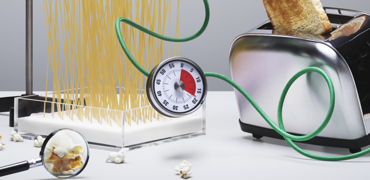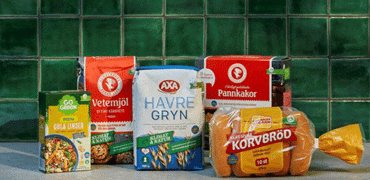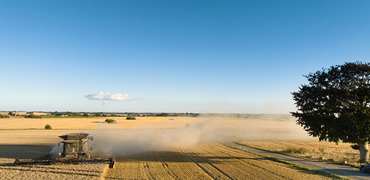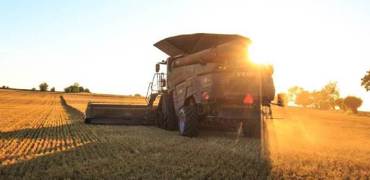The warehouse that keeps agriculture going
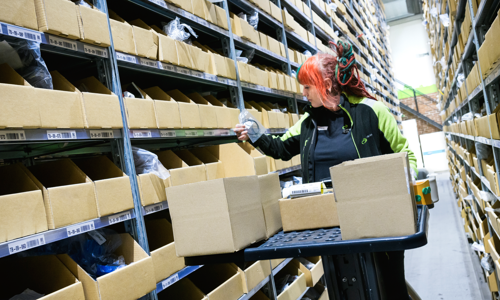
With its fast deliveries of spare parts, the central warehouse in Malmö, Sweden keeps the agricultural machinery in the Nordic region rolling. Committed employees and clear processes are some of the success factors.
LANTMÄNNEN MASKIN’S CENTRAL warehouse in southern Sweden looks like any other industrial premises in the Malmö industrial port. But when you walk through the door to the warehouse, you enter a world of your own. In here, there are a lot of yellow picking trucks that seem to be criss-crossing, but safety is key and there are strict traffic rules. The trucks project blue dots three metres in front of them to show when they are coming out of the long warehouse aisles with 5.5 metre-high shelves full of spare parts for agricultural machinery.
“Eja” – Eva-Lena Ek – is one of the order pickers we meet. With the aid of a handheld computer, she knows what to pick and where it is. The articles are sorted so that it should be easy to get a good flow. Eja has just become a permanent employee having been a temporary worker for 2.5 years at the warehouse.
“I work with all parts of the process: unpacking incoming items, picking orders and packaging finished orders. I like the variety, doing different things every week. Most of all, I probably like driving the truck all over the entire warehouse and picking orders”, she says.
EFFECTIVE ORDER MANAGEMENT is entirely down to the employees. It is their commitment and accuracy that enables the right article to reach the end customer as quickly as possible. Unplanned downtime is the nightmare of every machine owner.
A combine harvester that is left standing idle in the middle of threshing needs rapid deliveries of spare parts. During high season, a downtime can cost SEK 100,000 per hour.
ORDERS PLACED AT Lantmännen Maskin's central warehouse before 16.00 reach their destination either to one of their own facilities or to the end customer directly, before 07.00 the day after. They deliver to the entire Nordic region, as well as into Europe.
The warehouse is 8,300 square metres – roughly 1.5 football pitches – and physically houses around 165,000 items. In total, there are around six million articles in the warehouse system. It also includes articles that are stocked for other actors, including for the multinational manufacturer of agricultural machinery AGCO.
THE 50 EMPLOYEES work three shifts on a rotating basis between 07:00 and 20:30. Between 30 and 40 per cent of staff are women. In addition, they have temporary staff, mainly during the evening shift. In high season, for example during the harvest in August and September, they work seven days a week.
Margareta Åfeldt, or “Maggie” as everyone calls her is one of the warehouse’s meticulous pickers and is responsible for picking in three smaller aisles.
“I like working by myself and do my best work then. I get to do what I want and can do it at my own pace”, she says and explains that she likes that there is a competitive element:
“After each year I want to pick more and make fewer errors. I like it when there is a lot to do. If I come here in the morning and see that there are as many as 150 orders I can get into a bit of a panic, but then I get going and soon see that they are going down all the time.”
Eja and Maggie believe that those who work in the warehouse feel a great responsibility for getting things right.
“It is more important to get things done correctly rather than quickly. You have to be careful and make sure you really pick the right number of items too. Sometimes things do end up in the wrong place”, says Eja.

Maggie and Eja are two of the warehouse’s meticulous employees “We are like a family here”, says the Warehouse Manager Krister.
KRISTER NILSSON HAS been Warehouse Manager since 2014. When he shows us around the warehouse, he always has a couple of words with the employees we meet. He emphasizes their commitment:
“They are proud of their work no matter what it is. There is a fantastic sense of service here that I have not seen in any other industry or in any other workplace that I have worked in.”
The commitment shows in low staff turnover, which creates the conditions for a stable and safe operation.
“We are like a family here and I put a lot of time and effort into ensuring that the staff are comfortable. Our quality target is 99.85 per cent, which equates to one and a half incorrect picks per 1,000 items. That is incredibly high in the industry and compared to many other industries. Everything is monitored and we constantly look at how we can improve on minimising the number of errors”, says Krister.
His leadership creates the foundation for the successes and he has brought with him many insights from sport. He was goalkeeper when Ystads IF won the Swedish Championship in handball in 1992 and has continued to be active as a coach and leader.
![]()
For me, it's about "team before self". I like to challenge people: to get them to work together and to strive for the same goal. We also try to build from below by involving the staff in various projects, for example, we are now about to rebuild the warehouse.
But with many people on site, discussions can sometimes arise. There is a clear plan to capture problems at an early stage and communication is crucial. Krister is assisted by Johan Wirén, who is responsible for day-to-day operations, and three team leaders, one each for incoming goods, order picking and packing. He also emphasises contact with the union:
“We have close cooperation with Handels, especially the safety representatives. This makes the business incredibly strong and we quickly come to a decision because we have equal requirements and values. We work based on Lantmännen’s values. Much of what we do is about common sense - such as how to function in teams, how to take care of others, how to drive and take responsibility for their work.”
A SUCCESS FACTOR, according to Krister success is that the business is well-organised.
“Structure and clear processes are important for those who work in our warehouse operations. They create clarity, which is crucial for feeling confident about the assignment. The important thing for us is to see the people, how they work and work in teams”, concludes Krister, who believes that it also produces good results for the customers in the end.
Lantmännen Maskin's Central Warehouse
Location: Malmö industrial port
Area: 8,300 square metres
Number of employees: About 50 (60 including temporary staff)
Number of articles in warehouse (physical): 165,000
Total number of articles in the warehouse: About 6 million
Number of delivered packages per day: 1,000-1,500
Number of packed trucks leaving per day: 10-15







